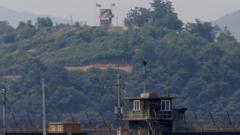A week after a tragic attack in Pahalgam that claimed 26 lives, the town is seeing a cautious return of tourists. While some remain hopeful for recovery, significant apprehension persists over the region's future and the impact on its tourism-centric economy.
Resilience and Uncertainty: Tourism in Pahalgam Struggles Post-Attack

Resilience and Uncertainty: Tourism in Pahalgam Struggles Post-Attack
Following a deadly militant attack, Pahalgam slowly welcomes back tourists amid rising tensions and economic fears.
In the wake of a tragic militant assault that left 26 individuals dead near the scenic mountain resort of Pahalgam in Indian-administered Kashmir, the town stands at a crossroads of hope and fear. Although signs of tourists returning, albeit in small numbers, are emerging, Pahalgam wears a somber mood one week after the attack.
Last Tuesday, gunmen targeted a group largely composed of visitors at Baisaran, a meadow known for its breathtaking views situated just three miles from Pahalgam, often heralded as "India's Switzerland." The brutal attack marks one of the gravest incidents in recent years, resonating deeply within local communities and igniting anger across India. The repercussions have escalated into heightened tensions between India and Pakistan, both of which lay claim to Kashmir, with each nation enacting countermeasures in response to the incident.
Uncertainty looms over Pahalgam's economy, heavily reliant on tourism, as previous incidents of violence in the region have rarely involved tourists as victims. According to local business owners, the aftermath has invoked fears toward their long-term livelihoods. While several tourists opted to stay despite panic over security, citing the high cost of returning flight tickets, some others expressed comfort from reassurances provided by local residents and security forces.
Among those calling for a show of solidarity with Kashmir's tourism sector was Bollywood actor Atul Kulkarni, who encouraged visitors not to cancel their travel plans, emphasizing that an increased presence could counteract the militants' aim to instill fear. However, the impact of the attack has already been stark, with reports indicating an alarming cancellation rate of nearly 90% for trips booked from major cities.
Local leaders stress that rebuilding the town's reputation and ensuring safety could take years. Tour operators report that tourists are confused by the heightened sense of imminent conflict between India and Pakistan, dampening the desire to visit the once-charming destination. While the Indian government has made claims of a safer Kashmir post-2019 due to the revocation of its autonomous status, this incident suggests a more precarious reality remains.
Infrastructure projects like the much-anticipated rail bridge connecting Kashmir to the rest of India, once heralded as symbols of development, now face uncertainty in their timelines amidst the unrest. Local businesses' investment prospects may also dwindle as security concerns become paramount for investors. Many view the ongoing violence as a barrier against future economic growth.
Speaking during a legislative assembly session, the state’s chief minister, Omar Abdullah, emotionally recounted the tragic losses sustained from the attack, lamenting the inability to safeguard visitors attracted to the region. As Pahalgam grapples with the aftermath, both the local population and prospective travelers remain in a delicate balance between resilience and concern in the face of ongoing tensions.

















